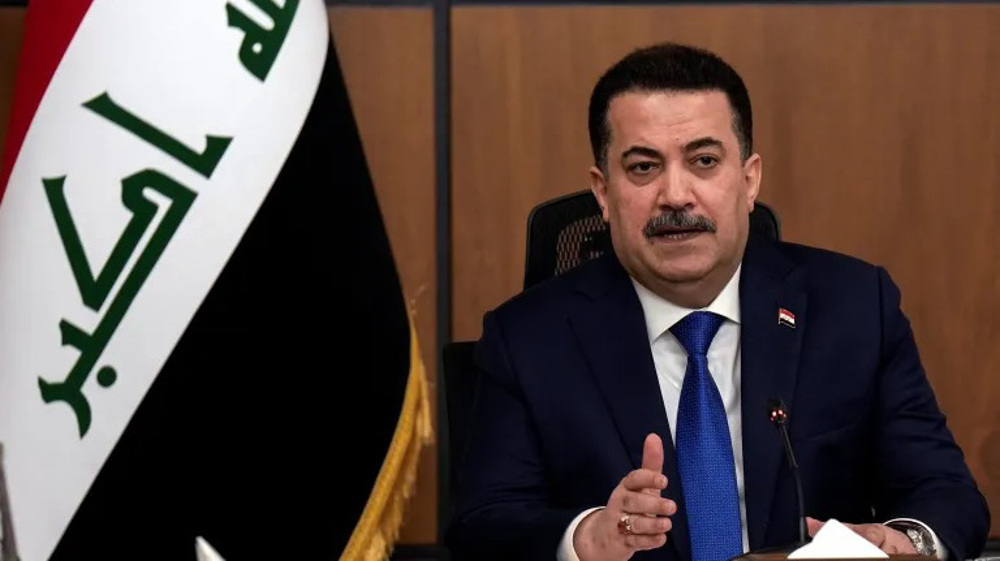Iraqi Prime Minister Mohammed Shia’ al-Sudani says the US-led military coalition purportedly formed to fight the Daesh terrorist group will eventually wind down its presence in the Arab country.
Speaking in an interview with the al-Arabiya television news network, Sudani stated that the Western alliance’s mission will end at the Baghdad government’s official request.
“The main purpose of winding down the US-led military coalition’s mission is to eliminate all possible pretexts for attacks on its advisors,” he said.
Sudani also censured the US military’s latest airstrikes against positions manned by anti-terror resistance groups in the western part of the country close to the border with Syria, asserting, “Any kind of military attack on the Iraqi territory is unacceptable.”
He said Iraq has not had any contact with the United States following the aerial assaults.
The Iraqi prime minister also noted that the withdrawal of US-led foreign forces from the semi-autonomous Kurdistan region is among the issues raised in the course of negotiations between Baghdad and Washington to remove the troops from the country.
“The Iraqi government has come up with a formula, under which the [resistance] groups will stop their [retaliatory] attacks in exchange for the cessation of American offensives,” Sudani explained.
Iraq adopted the law to expel foreign forces after Washington assassinated top Iraqi and Iranian anti-terror commanders four years ago.
General Qassem Soleimani, commander of the Quds Force of Iran’s Islamic Revolution Guards Corps (IRGC), and Abu Mahdi al-Muhandis, the second-in-command of Iraq’s Popular Mobilization Units (PMU), were martyred along with their comrades in a US drone strike that was authorized by then-president Donald Trump near Baghdad International Airport on January 3, 2020.
‘Iraq, US must return to dialogue over future of coalition forces’
Meanwhile, Iraqi Foreign Minister Fuad Hussein stressed the need to return to the negotiating table over the future of US-led forces in Iraq.
Hussein, in a phone call with US Secretary of State Antony Blinken on Tuesday, stressed the Iraqi government’s rejection of the latest US airstrikes and such attacks.
He said that “Iraq is not an arena for settling scores between rival countries.”
Hussein also formally demanded the US Treasury Department reconsider the sanctions it had imposed on several Iraqi banks, raising doubts about whether those sanctions were put in place over compliance issues or “other political reasons.”
US Central Command (CENTCOM) said in a statement on Friday that its military forces struck more than 85 targets in Iraq and Syria “with numerous aircraft to include long-range bombers flown from the United States.”
“The air strikes employed more than 125 precision munitions,” it added in a statement.
US President Joe Biden stated that the strikes were the first in a series of actions by Washington in response to a drone attack that killed a number of soldiers at a remote US base in Jordan.
“Our response began today,” Biden said. “It will continue at times and places of our choosing,” he stated.
Three US soldiers were killed and about 40 others injured in the assault on the military base known as Tower 22 near the Jordan-Syria border on Sunday.
The Islamic Resistance in Iraq, an umbrella group of anti-terror fighters, in a statement published on its Telegram channel claimed responsibility for the drone strike.
In retaliation for the flurry of US aerial assaults on several locations in Iraq and Syria, the Islamic Resistance in Iraq announced that it had conducted missile strikes against the Ain al-Asad Airbase, housing US occupation forces in the western Iraqi province of al-Anbar.
The group also said it had staged missile and drone strikes against the strategic al-Tanf military base in southeastern Syria near the border with Jordan and Iraq, as well as the al-Khadra Village in Syria’s northeastern province of al-Hasakah.




